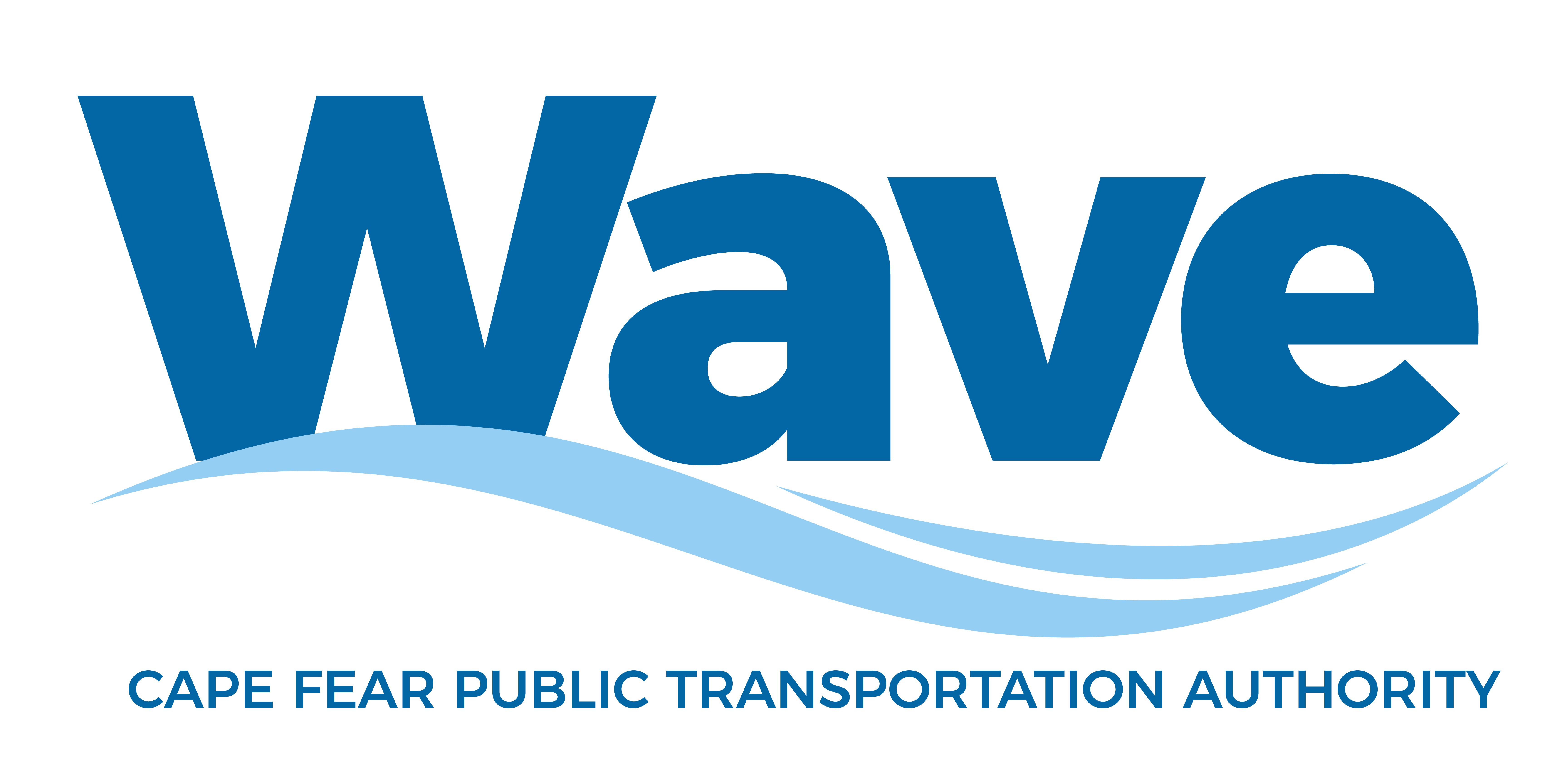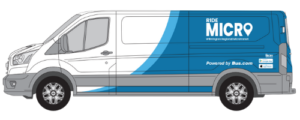RideMICRO
Flexible service connecting portions of Brunswick, Pender, and New Hanover Counties.
What is RideMICRO?
RideMICRO, is a point-to-point service available to anyone traveling within the designated service network! It is a rideshare service offered in smaller vehicles. Passengers schedule rides rather than waiting for a bus on a fixed schedule.
Passengers can book an on-demand ride from a ‘virtual stop’ within a RideMICRO ‘zone’ and be connected to Wave Transit’s fixed-route service or brought to a destination within a zone. This new transportation offering provides greater flexibility, decreased wait times, and increased stop locations than a traditional fixed-route bus.

Book. Pay. Ride.
Hours of Operation:
Regional Zones 1 & 2
Zone 1
Weekdays:
6:30am to 7:00pm
Zone 2
Weekdays:
AM – 6:30am to 10:00am
Midday service break between 10:00am – Noon
PM – 12:00pm to 7:00pm
Local Zones 3 & 4
Weekdays: 6:00am – 8:00pm
Saturday: 8:00am – 6:00pm
Sunday: 9:00am – 5:00pm
Schedule your ride:
Download the RideMICRO app on Google Play and the App Store.
Call toll-free: 1-844-764-1223
Reserve your ride online
Pay for your Ride:
Option 1: Pay using a debit or credit card inside the app
Option 2: Pay with exact change upon boarding
Option 3: Purchase a ticket from Forden Station or Padgett Station
Interactive Service Zones Map
Explore zones, stops, and search for destinations within this interactive map.
Frequently Asked Questions
What is RideMICRO?
RideMICRO is Wave Transit’s microtransit service. Microtransit is an alternative transportation offering that resembles a rideshare or carpool rather than a fixed-route bus. Microtransit programs typically operate with cars, vans, or shuttles. RideMICRO is an on-demand, point-to-point service open to anyone traveling within the defined service area. The service is wheelchair accessible with no restrictions on trip purpose.
This service resembles our Paratransit/DART service but the two are not the same.
The two biggest differences:
1. DART requires an application determining eligibility based on disability status;
RideMICRO is not a disability-specific program – anyone can ride and no application is needed.
2. DART travels inside the fixed-route service area;
RideMICRO travels in zones largely outside the fixed-route service area.
Where can I RideMICRO?
To thousands of virtual stops in Brunswick, New Hanover, and Pender Counties!
There are four RideMICRO transportation zones. Two are local and serve portions of northern and southern New Hanover County. Two are regional with one serving a portion of Brunswick County and the other serving a portion of southeast Pender County.
All zones connect to the fixed-route service area. Most customers intending to travel in the fixed-route area set their drop-off point as Padgett Station if they are in Zones 1 or 4, Forden Station in Zones 2 or 4, or Monkey Junction Transfer Station in Zone 3.
Padgett and Forden Stations are full-service bus stations with restrooms, indoor seating, and customer service agents. Monkey Junction Transfer Station is how you will find this location listed in the RideMICRO app. This location is two bus shelters at the southernmost point of the fixed-route network. It is not a full-service building.
What are the hours of operation?
Hours of Operation:
Regional Zones 1 & 2
Zone 1
Weekdays:
6:30am to 7:00pm
Zone 2
Weekdays:
AM – 6:30am to 10:00am
Midday service break between 10:00am – Noon
PM – 12:00pm to 7:00pm
Local Zones 3 & 4
Weekdays: 6:00am – 8:00pm
Saturday: 8:00am – 6:00pm
Sunday: 9:00am – 5:00pm
Interruptions to service will be reported under ‘Service Alert’s on our homepage. RideMICRO service closures follow Wave Transit’s holiday service schedule.
How much does it cost?
All RideMICRO trips are $2 per person, per one-way trip. Passengers can pay for their trip in the RideMICRO App using a debit or credit card, with cash (exact change) upon boarding, or purchase a pass ahead of time at a Wave Transit transfer station.
Passes are available for purchase at Forden Station, Located at 505 Cando St., Wilmington, NC 28405; and Padgett Station, located at 520 N 3rd St, Wilmington, NC 28401; during regular operating hours.
No Reduced Fare pricing is available for RideMICRO. If connecting with the fixed-route network, bus fare must be paid separately. There are no free transfers between RideMICRO and fixed-route bus.
How do I schedule a ride?
Customers can book a ride through the RideMICRO app (available on Google Play and the App Store), by using the online form, or by calling the toll-free number and speaking with a RideMICRO dispatcher.
Toll-Free Number: 1-844-764-1223
Use the Online Form
If you book your ride by phone or through the online form, a call center representative will contact you between the hours of 7:00am to 10:00am or 12:00pm to 7:30pm to confirm your reservation. Reservations must be made no less than one hour prior to your trip and can be made up to one week in advance of your trip.
You have the option to schedule your ride one week in advance or request an immediate pickup, however, advance reservation is encouraged. Scheduling is first-come, first-serve. Last minute reservations cannot be accommodated if the schedule is full with previously booked trips.
How will I know when my ride is on the way? Can I track it?
Download the RideMICRO app to track your ride! App users will be able to watch their vehicle as it drives to meet them and are given an estimated time of arrival.
Can I bring my child?
Yes, you may bring your child. Please indicate in your reservation that you will be traveling with a child.
Children 4 years old and younger travel free with a fare paying adult – up to 3 fare-free children per fare paying adult.
Customers traveling with a child who needs a car seat must provide their own approved car seat or booster seat. Car seats are generally not required on large buses but RideMICRO is operated in small vans and SUVs.
The customer must install the car seat and remove it from the vehicle at the end of their trip. RideMICRO operators are not permitted to touch or install car seats.
What are the rules and regulations?
The same regulations apply for RideMICRO as they do for the buses and shuttles; these include but are not limited to the following: no eating or drinking, no open containers of alcohol, no smoking or vaping, no weapons, and no pets. Service dogs are allowed on RideMICRO.
Children 13 and older may ride without an adult and with siblings or other children younger than them. Situations will be assessed if needed to determine if a child can safely ride alone or be responsible for siblings or children younger than themselves.
What COVID safety measures are in place?
Riders are encouraged to wear masks while using public transportation.
All RideMICRO vehicles are cleaned, fueled and checked as part of standard daily operations. In response to COVID-19, additional safety protocol are in place including:
- spraying and wiping all bus areas with commercial disinfecting spray;
- spraying and wiping door handles, all areas and surfaces throughout transit van multiple times a day with commercial disinfecting spray;
- providing hand sanitizer for operators and customers
The Pilot Program
RideMICRO is a pilot program that was launched in October 2021. The North Carolina Department of Transportation (NCDOT) funded the project at 100% to support innovation in public transportation and allow Wave Transit to be among the first to build and test a regional microtransit program in the state. The program has seen growing pains and successes. Here’s how it’s going…
- More than 20,000 trips completed since launch
- Regional and local connectivity achieved
- New RideMICRO booking app was developed and successfully launched
- First of Wave Transit’s services to offer online fare payment
RideMICRO is seeing consistent growth as the pilot continues to develop. The four zones rolled out in phases and ridership spiked following the launch of each zone. August 2022 RideMICRO ridership exploded with that single month seeing ridership nearly totaling that of previous fiscal year. Our community and customers are our biggest supporters. Changes to the program are frequently the result of customer feedback. NCDOT’s funding for this pilot created the opportunity for customers and staff to build a service they want to use without having to borrow from general operating funds. In the pilot’s second and third years, financial support from New Hanover County bolstered operations within the two New Hanover County zones and allowed for even greater success.

